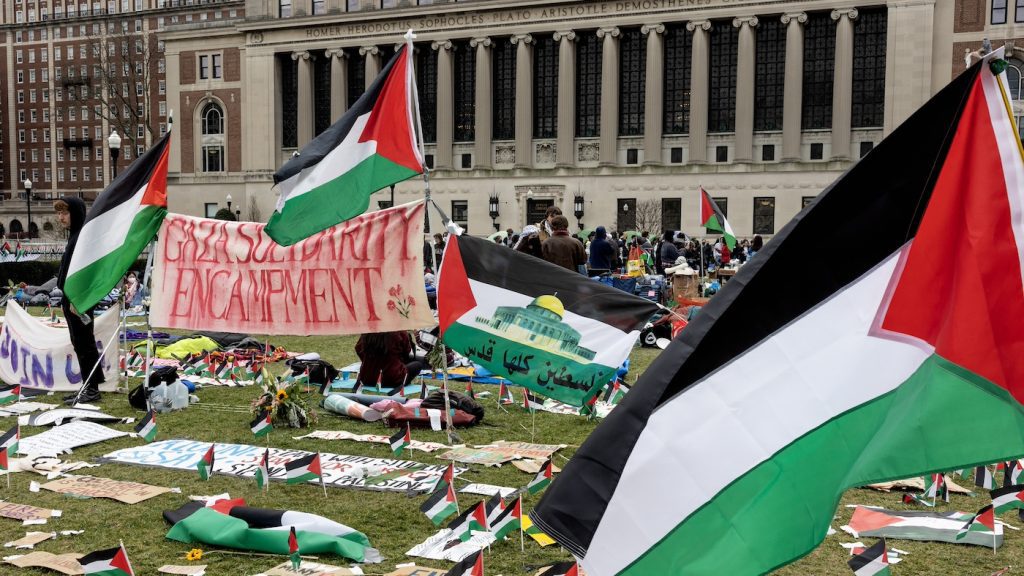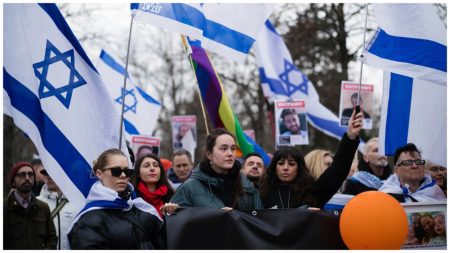Columbia University leaders seem to have made student protesters more angry about the Israel-Hamas war by deciding to arrest over 100 students during pro-Palestine demonstrations on Friday.
Under pressure from politicians on both sides, university President Minouche Shafik is being urged to resign as hundreds of students now occupy the center of campus in a protest for a cease-fire in the war and for the Biden administration to stop military aid to Israel.
Students started the Gaza Solidarity Encampment last Wednesday, the same day Shafik faced harsh questioning from the House Education Committee on campus antisemitism.
Shafik’s order for arrests has only strengthened the demonstrations, which have now spread to numerous college campuses nationwide, including New York University, Yale University, and the Massachusetts Institute of Technology (MIT).
The Biden administration criticized the protests Sunday, calling them “blatantly antisemitic” and saying they were encouraging “calls for violence.” New York City Mayor Eric Adams (D) made similar comments.
At least three Barnard College students have been suspended, including the daughter of Rep. Ilhan Omar (D-Minn.).
Safety concerns for Jewish students on campus have also been raised, leading Columbia to move classes online starting Monday, hours before the Jewish holiday of Passover begins.
Antisemitism has been increasing both nationwide and internationally since Hamas’s Oct. 7 attack on Israel, but a significant portion of the protesting students are Jewish, and protest groups have fought back against characterizations of their demonstrations as antisemitic. There have been no reports of violence from the protests.
“We are frustrated by media distractions focusing on inflammatory individuals who do not represent us,” protest leaders wrote in a statement Sunday. “Our members have been misidentified by a politically motivated mob.”
“We firmly reject any form of hate or bigotry and stand vigilant against non-students attempting to disrupt the solidarity being forged among students,” they continued. “Palestinian, Muslim, Arab, Jewish, Black and pro-Palestinian classmates and colleagues who represent the full diversity of our country.”
On Monday, lawmakers from both parties called on Shafik to rein in the protests or step down from her post. Rep. Elise Stefanik (R-N.Y.) said university leadership has “clearly lost control of its campus, putting Jewish students’ safety at risk.”
Sen. John Fetterman (D-Pa.) added that Shafik should “do your job or resign,” comparing the protests to the violent white supremacist demonstrations in Charlottesville, Va., in 2017.
The Israeli government also commented on the protest, calling the students “terrorists” in a post on the social media platform X.
On Sunday, Education Committee Chair Virginia Foxx (R-N.C.) warned that she could call Shafik in front of her committee again over the “unacceptable” demonstrations.
The failure of Columbia to quickly restore order and safety on campus is a serious violation of the University's Title VI obligations. This could affect their federal funding, and they need to fix it immediately. If they don't fix this danger, the Committee won't hesitate to hold them accountable.
As the Israeli military operation in Gaza becomes more and more disliked among Americans, especially Democrats, those critical of antiwar protests have focused on Ivy League college campuses.
The leaders of Harvard, the University of Pennsylvania, and MIT faced a similar grilling from the Education Committee in December, which caused widespread backlash and eventually led to two of the three schools' heads resigning.
The Biden administration has also criticized the Israeli government's military advance in Gaza and has urged it to allow more humanitarian aid into the territory.
Six months after the start of the Israel-Hamas war, a majority of Democrats said they think the U.S. should limit military aid to Israel, according to polls, citing concerns over mass civilian casualties in Gaza and accusations of war crimes.
Regarding the criticisms of Columbia's administration, Shafik said Monday in a statement that she is “deeply saddened” by campus protests.
“The decibel of our disagreements has only increased in recent days,” she said. “These tensions have been exploited and amplified by individuals who are not affiliated with Columbia who have come to campus to pursue their own agendas. We need a reset.”
“There is a terrible conflict raging in the Middle East with devastating human consequences,” she continued. “But we cannot have one group dictate terms and attempt to disrupt important milestones like graduation to advance their point of view. Let’s sit down and talk and argue and find ways to compromise on solutions.”
University leaders will hold discussions with student protesters and faculty in the coming days in an attempt to “deescalate” tensions on campus, she said.









